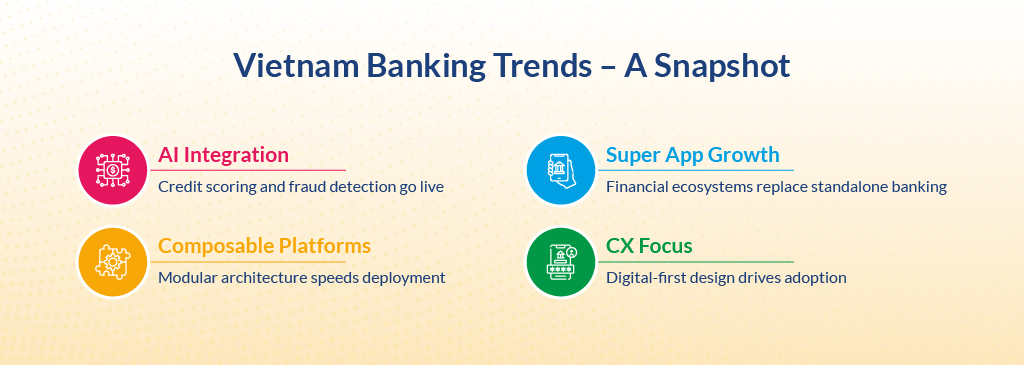Vietnam’s banking sector is undergoing a massive transformation in 2025. Digital banking revenue is set to hit US$3.8 billion this year, while mobile payment transactions continue growing at 100%+ annually. Here’s what’s really driving the change and why it matters for banks and fintech operating in this market.
1. AI-Powered Digital Banking Services Go Mainstream
Vietnamese banks aren’t just talking about artificial intelligence anymore; they’re actually using it. The shift from experimentation to real implementation is happening fast.
Key developments this year include:
- Over 50% of commercial banks have tested or applied AI in various operations, from customer service to credit approval
- TPBank reduced loan approval times from 3 days to minutes using AI-driven credit scoring
- VPBank uses AI to monitor millions of daily transactions, detecting fraudulent activities in real-time
The practical benefits are obvious: faster service, better security, and personalised experiences that Vietnamese customers actually want.
2. Super Apps Reshape Financial Habits
The super app revolution is changing how Vietnamese people think about money and banking. These platforms are becoming the primary gateway to financial services for millions.
What’s happening right now:
- MoMo leads with 4.16 weekly usage sessions, far outpacing competitors
- E-wallet transaction values exceeded VND 500 trillion (USD 20 billion) in 2025, a tenfold increase since 2017
- Mini-app ecosystems now feature over 100 integrated services within single platforms
Super apps aren’t just payment tools—they’re becoming complete financial ecosystems where users can pay bills, invest, get loans, and manage their entire financial lives.
3. Open Banking APIs & Enhanced Cybersecurity
Vietnam’s regulatory push towards open banking is creating real opportunities for both traditional banks and fintech companies. The framework is finally moving from policy papers to practical implementation.
The regulatory foundation includes:
- Fintech sandbox regulations enabling testing of credit scoring, open APIs, and P2P lending with robust information security protocols
- Standardised API requirements forcing banks to adopt common data exchange protocols
- Biometric authentication and digital signature verification now mandatory for all online banking transactions
This isn’t just regulatory compliance, it’s unlocking new business models and partnership opportunities that didn’t exist before.
4. Composable Banking Architecture Enables Rapid Deployment
Vietnamese banks are embracing modular, API-first platforms that allow them to launch new products quickly without overhauling entire systems.
Real-world benefits include:
- Banks can now launch new retail banking solutions in weeks instead of years
- Seamless integration across multiple channels of banking including mobile, web, and ATM networks
- Enhanced customer onboarding using digital identity verification with strong data protection measures
The composable approach means banks can respond to market changes and customer demands much faster than traditional architecture allows.
5. Enhanced CX Through Digital-First Design
Vietnamese customers expect banking experiences that match the quality of their favourite apps. Banks that understand this are winning market share.
Successful strategies focus on:
- Hyper-personalised financial products using machine learning and customer data analytics
- Streamlined processes that take advantage of government digital identity initiatives
- Integration with social commerce platforms that Vietnamese consumers use daily
- 24/7 customer service through AI-powered chatbots backed by human support
Banks treating digital transformation as a technology project rather than a customer experience initiative are falling behind.
The Clayfin Advantage
As Vietnamese banks navigate these trends, having the right technology partner becomes crucial. Clayfin’s digital banking platforms provide the foundation banks need to implement AI-driven insights, and deploy composable banking services that meet local regulatory requirements.
Clayfin helps financial institutions build the flexible, customer-centric platforms that succeed in Vietnam’s competitive market.
Learn more about our banking solutions designed for emerging markets.

